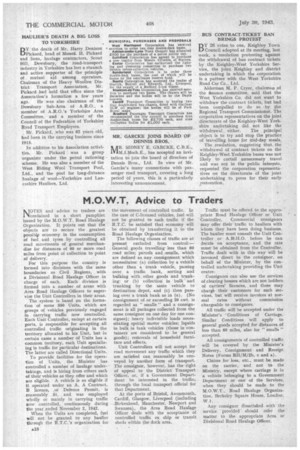M.O.W.T, Advice to Traders
Page 20

If you've noticed an error in this article please click here to report it so we can fix it.
MOTES and advice to traders are 1 Icontained in a short pamphlet issued by the M.O.W.T. Road Haulage Organization. It points out that the objects are to secure the greatest possiblt economy in the consumption of fuel and tyres by controlling all road movements of general merchandise for distances of 60 or more road miles from point of collection to point of delivery. .
For this purpose the country is formed into divisions with the same boundaries as Civil Regions, with a Divisional Road Haulage Officer in charge of each. Each division is formed into a number of areas with Area Road Haulage Officers to supervise the Unit Controllers in their areas.
The system is based on the formation of some 350 Units, which are groups of vehicles previously engaged in carrying traffic now controlled. Each Unit Controller, except at certain ports, is responsible for accepting all controlled traffic originating in the territory allocated to his Unit, but in certain cases a number of Units has a common territory, each Unit specializing in traffic for particular destinations. The latter are called Directional Units.
To provide facilities for the operation of Units, the Minister has controlled a number of haulage undertakings, and is hiring from others such of their vehicles as they offer and which are eligible. A vehicle is so eligible if it operated under an A, A Contract, B licence, .or Defence Permit, is seasonably fit, and was employed wholly or mainly in carrying traffic DOW controlled, continuously during the year ended November 2, 1942.
When the Units are completed, fuel will not be granted to any haulier through the R.T.C.'s organization for
themovement of controlled traffic. In the case of C-licensed vehicles, fuel will not be granted to such traffic if the R.T.C. be satisfied that economy will be obtained by transferring it to the Road Haulage Organization.
The following classes of traffic are at present excluded from control:— General goods travelling less than 60 road miles; parcels and smalls, which are defined as any consignment which necessitates: (a) collection by a vehicle other than a trunk vehicle, passing over a traffic bank, sorting and bulking with other goods and trunking; or (b) collection in bulk and trunking by the same vehicle to destination depot, and (c) then passing over a trunk bank as in (a). (No consignment of or exceeding 20 cwt. is regarded as " smalls " and a consignment is all packages collected from the same consignor on one day for one consignee); heavy indivisible loads necessitating special motor vehicles; liquids in bulk in tank vehicles (those in containers are considered to be general goods); removals of household furniture and effects.
Unit Controllers will not accept for road movement any traffic which they are satisfied can reasonably be conveyed by another form of transport. The consignor, however, has the right of appeal to the District Transport Officer, or, if a Government Depart'Cent be interested in the traffic, through the local transport official for that Department.
At the ports of Bristol, Avonmouth, Cardiff, Glasgow, Liverpool (including • Birkenhead, Manchester, Newport and Swansea), the Area ,Road Haulage Officer deals with the acceptance of controlled traffic ex ship or transit sheds within the dock area.
Traffic must be offered to the appropriate Road Haulage Officer or Unit Controller. Commercial consignors may offer their traffic to hauliers with Whom they have been doing business. The haulier must consult the Unit Controller Or A.R.H.O. before he can decide on acceptance, and the rate must be obtained from the Controller. Traffic dealt with in this way will be invoiced direct to the consignor, on behalf of • the Minister, by the controlled undertaking providing the Unit centre.
Consignors can also use the services of clearing houses which are not holders of carriers' licences, . and these may charge their customers for such services, but will receive invoices at normal rates without commission chargeable to consignors.
All traffic will be accepted under the Minister's 'Conditions of Carriage. Similar Conditions will apply to general goods accepted for distances of less than 60 miles, also for " smalls" accepted.
All consignments of controlled traffic will be covered by the Minister's Delivery, Consignment and Receipt Notes (Forms RII/M/2b, c and a).
Claims for loss, etc., must be made on the carrier, and not to the Ministry, except where carriage is in a vehicle belonging to a Government Department or one of the Services. when they should be made to the M.O.W.T., Road Haulage Organization, Berkeley Square House, London, W.1.
Any consignor dissatisfied with the service provided should refer the matter to the appropriate Area or Divisional Road Haulage Officer.




















































